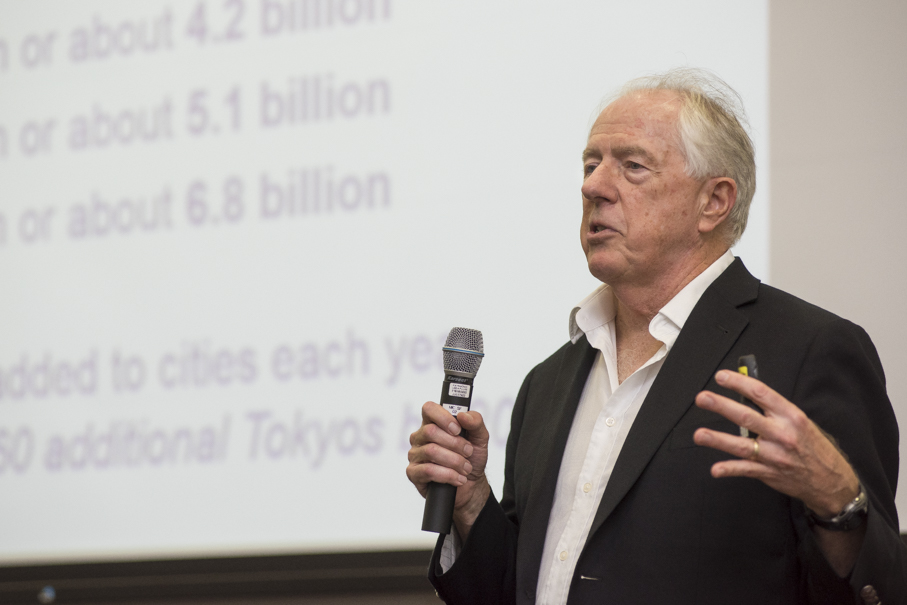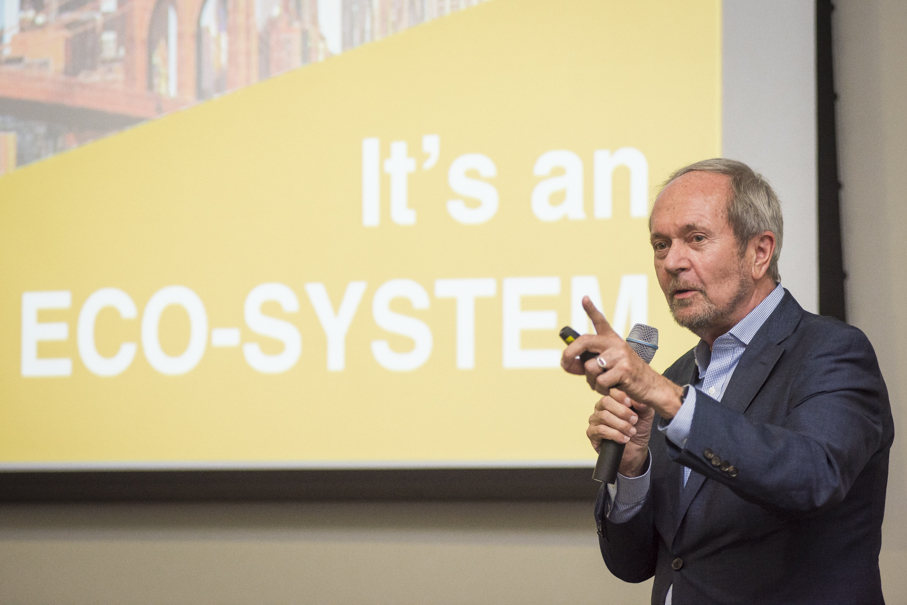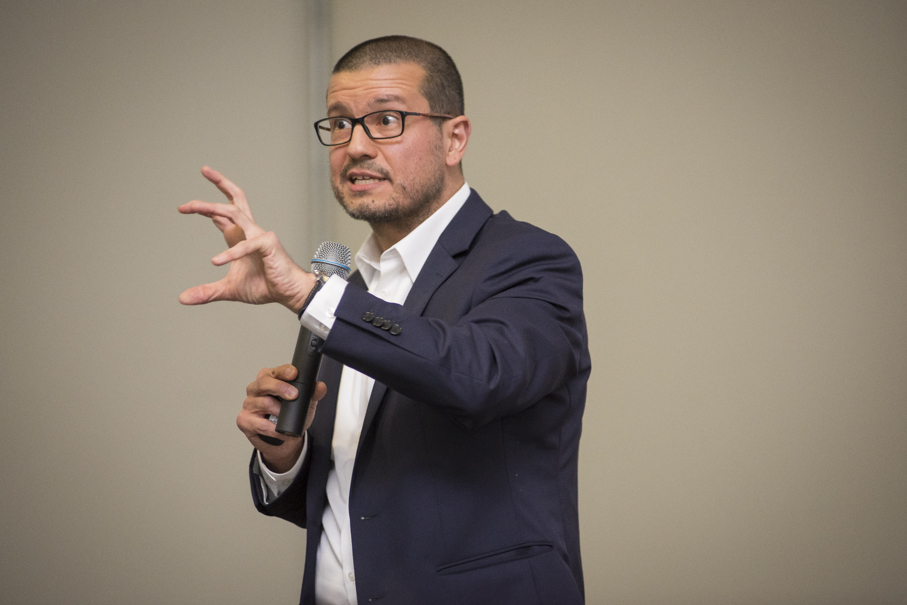Workshop by the Alliance for Innovation discusses smart cities
The Alliance for Innovation of Porto Alegre, led by PUCRS, UFRGS and Unisinos, offered the Smart Cities Workshop, at the auditorium of Global Tecnopuc on Sep 24. Members of the Global Federation Competitiveness Councils (GFCC) talked to representatives of universities, businesses and the government about global challenges and local business opportunities that could represent a better life for the population. They talked about cities that produce and retain talents and attract people from all over the world to create solutions. The event was opened by the Superintendent of Innovation and Development of PUCRS, Dr Jorge Audy, who also represents the University in the Alliance’s strategic committee.
Global trends that shape the future
Banning Garrett, senior member of GFCC and Singularity University professor, made a list of global trends that defy the future: population growth, middle class expansion, mass urbanization, increased demand for food, water and energy, volatile character of global economy, geopolitical economies and the acceleration of technological changes.
 He stated that 65 million our of 70 million people move to urban areas every year, and that today the urban population accounts for 55% out of the total of 7,7 billion people on the planet and that by 2050 this number will have reached 70% out of 9,7 bi. “Opportunities are to be found in the cities”, said Garrett. He mentioned that urban areas are the key to the future because that is where the resources for education, health care and other services are found.
He stated that 65 million our of 70 million people move to urban areas every year, and that today the urban population accounts for 55% out of the total of 7,7 billion people on the planet and that by 2050 this number will have reached 70% out of 9,7 bi. “Opportunities are to be found in the cities”, said Garrett. He mentioned that urban areas are the key to the future because that is where the resources for education, health care and other services are found.
Poverty, diseases, violence and terrorism, shanty towns (from 1 to 2 billion by 2030), environmental disasters and increased unemployment are some of the problems to be faced. In Garrett’s view, cities have a role to be played as they need to share their best practices and collaborate to minimize the impact of climate changes. He takes his chances on Smart cities to optimize health systems, education and transport. He also sees technology as a means to increase transparency of governments and citizen participation.
Talents and leaders
 Jerry Hultin, organizer of Smart Cities New York and member of GFCC, began his talk by quoting some words from the president of the federation, Deborah Wince-Smith: “Talent is the fuel of the 21st century”. Hultin claims that the development of an ecosystem of innovation – rather than a mere agenda – depends, in the first place, on how you attract, train and retain talents.
Jerry Hultin, organizer of Smart Cities New York and member of GFCC, began his talk by quoting some words from the president of the federation, Deborah Wince-Smith: “Talent is the fuel of the 21st century”. Hultin claims that the development of an ecosystem of innovation – rather than a mere agenda – depends, in the first place, on how you attract, train and retain talents.
Based on his experiences in New York, known as high tech, he said that creating smart cities urges for the implementation of a leading committee involving universities, governments and businesses. He listed creativity (and competitiveness), concentration (and practicality) and capital (and curiosity) as major elements. In NY, he mentioned Cornell Tech, which was built in five years, and a laboratory that serves as business incubator for 100 new businesses, as it attracts people from all over the world.
Major opportunities and the role of universities
 Rio Grande do Sul-born Roberto Alvarez, GFCC’s CEO and Singularity University professor, talked a bit about the federation, which congregates 35 countries, including governmental agencies, businesses, private organizations and 45 universities from 25 different nations. He argued that the problems that arise in cities are great business opportunities, especially in 35 metropolis, such as São Paulo, Rio de Janeiro and Buenos Aires, and they have consequences in medium-sizes cities, such as Porto Alegre. He talked about the evolution in terms of architecture and the incorporation of sustainable energies from the government regulation and the encouragement to the development of new technologies. To his mind, people should be concerned about the actions geared towards wellness as he mentioned the expansion of diseases associated with people’s life styles (obesity and diabetes), which might bring about changes from design to sanitation.
Rio Grande do Sul-born Roberto Alvarez, GFCC’s CEO and Singularity University professor, talked a bit about the federation, which congregates 35 countries, including governmental agencies, businesses, private organizations and 45 universities from 25 different nations. He argued that the problems that arise in cities are great business opportunities, especially in 35 metropolis, such as São Paulo, Rio de Janeiro and Buenos Aires, and they have consequences in medium-sizes cities, such as Porto Alegre. He talked about the evolution in terms of architecture and the incorporation of sustainable energies from the government regulation and the encouragement to the development of new technologies. To his mind, people should be concerned about the actions geared towards wellness as he mentioned the expansion of diseases associated with people’s life styles (obesity and diabetes), which might bring about changes from design to sanitation.
Alvarez also addressed the concept of innovation as he stated that in the USA, the importance of the development of technologies has been around since the day the federation opened its doors, whereas in Brazil people are still not sure about its relevance. He took the chance to highlight the importance of the Alliance for Innovation of Porto Alegre brining this topic to the agenda. “Universities are essential for innovation.” He stressed the need for convergence and circulation, that is, that companies and educational institutions speak the same language. He defended new models to give more speed to universities and leaders capable of changing some patterns. In Alvarez’s view, the most innovative ones are those that employ external resources, blend with society and have an “entrepreneurial attitude” as a form of thinking and acting.
With the moderation of UFRGS professor Dr Luiz Carlos Pinto Silva, the guests joined a roundtable that discussed how to make Porto Alegre a smart city. They were joined by Dr Fabiano Hessel, School of Technology professor and the coordinator for the Center for Innovation in Smart Cities of PUCRS, Anielle Guedes.